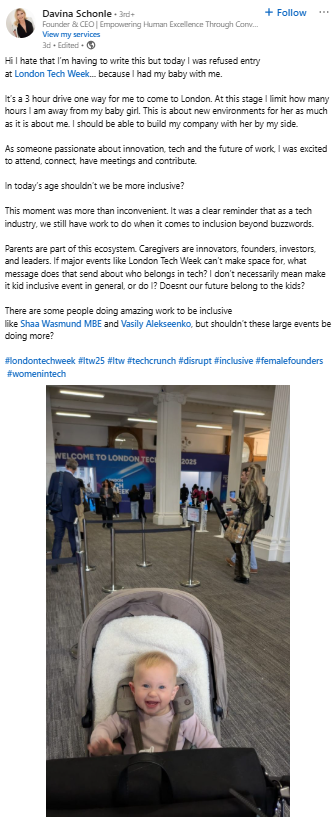London Tech Week Under Fire After Barring Woman Tech Founder Who Had Baby in Tow
London Tech Week stated their event isn't designed for under-16s

London Tech Week, a prominent event in the global technology calendar, is facing flak over an incident wherein a woman tech founder, accompanied by her baby, was reportedly denied entry, igniting a serious debate about inclusivity and accessibility within the tech industry's major gatherings.
Davina Schonle, the founder of AI company Humanvantage, has urged business events to become more inclusive after being refused entry because she had her baby with her at the event.
A Mother's Exclusion: The London Tech Week Incident
Davina Schonle had planned to attend London Tech Week with her young daughter, who was in a pram. However, after a three-hour drive to the event, she was disheartened to be denied access due to having her daughter with her.
In a LinkedIn post, Schonle explained that she limits how long she's away from her baby, believing she should be able to 'build my company with her by my side.' Her post detailing the experience quickly ignited a discussion about inclusion within the tech industry on the platform.

A McKinsey report from 2023 highlighted a clear gender imbalance, revealing that women held approximately 35% of entry-level tech roles but only 14% of senior leadership positions. Meanwhile, research carried out by Prospects in 2024 showed that 29% of IT professionals in the UK identify as female or non-binary.
Sparking Debate: Inclusivity in the Tech Sector
'As someone passionate about innovation, tech and the future of work, I was excited to attend, connect, have meetings, and contribute,' Schonle wrote in her LinkedIn post. 'In today's age shouldn't we be more inclusive? This moment was more than inconvenient. It was a clear reminder that as a tech industry, we still have work to do when it comes to inclusion beyond buzzwords,' she added.
Schonle highlighted that parents are integral to this ecosystem, noting that caregivers are also innovators, founders, investors, and leaders. Then she posed a crucial question: "If major events like London Tech Week can't make space for us, what message does that send about who belongs in tech?'
She said, 'I don't necessarily mean make it a kid-inclusive event in general, or do I? Doesn't our future belong to the kids?' Towards the end of her post, Schonle highlighted the excellent inclusivity efforts of individuals like Shaa Wasmund MBE and Vasily Alekseenko, then asked, 'shouldn't these large events be doing more?'
Schonle later told The Times that the incident left her feeling 'absolutely humiliated' and 'angry.'
Calls for Change: Challenging Industry Norms
Davina's LinkedIn post garnered over 3,800 reactions and 1,000 comments within two days. Many commenters proposed boycotting London Tech Week unless the organisers revise their policies regarding parents attending with children.
'Say WHAT? This is a disgrace. Someone at Informa needs to address this,' one LinkedIn user wrote.
Another user expressed their dismay, stating, 'Absolutely appalling. It can be easy to forget within the echo chamber of female founder networks that things like this happen - there is still SO MUCH work to do. So sorry you had to go through this, well done for calling it out with such grace.' Others expressed gratitude to Davina for championing the cause of parents within the tech industry.
London Tech Week Responds to the Incident
London Tech Week told The Independent: 'We're aware that one of our attendees wasn't allowed to enter with their child yesterday. As a business event, the environment hasn't been designed to incorporate the particular needs, facilities, and safeguards that under-16s require.'
'We want everyone in the tech community to feel welcome at London Tech Week. We've reached out directly to the person involved to discuss what happened and use this experience to inform how we approach this at LTW in the future.'
Originally published on IBTimes UK




















